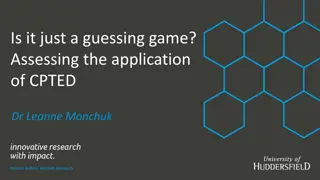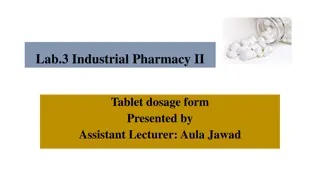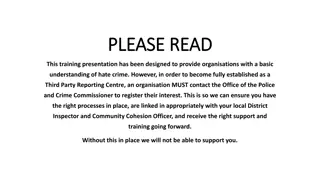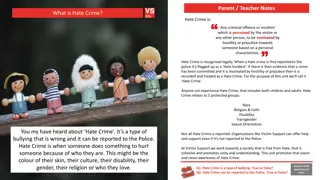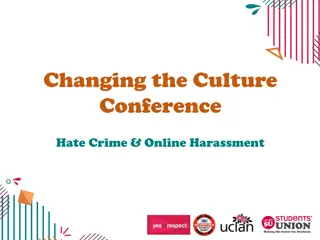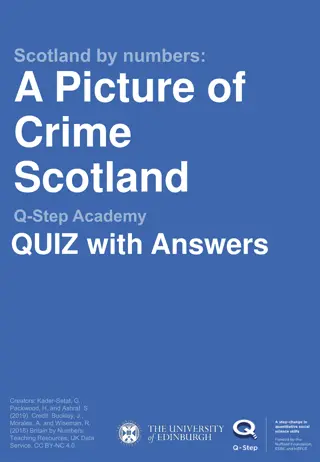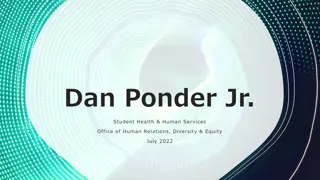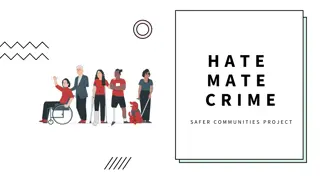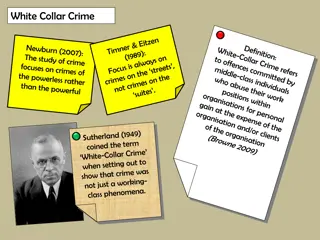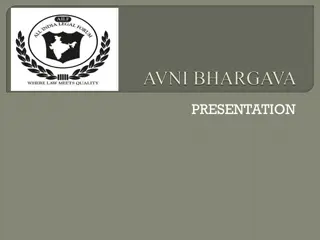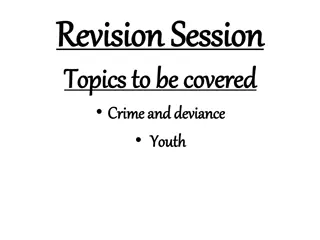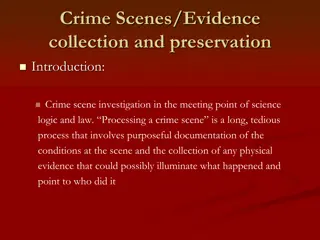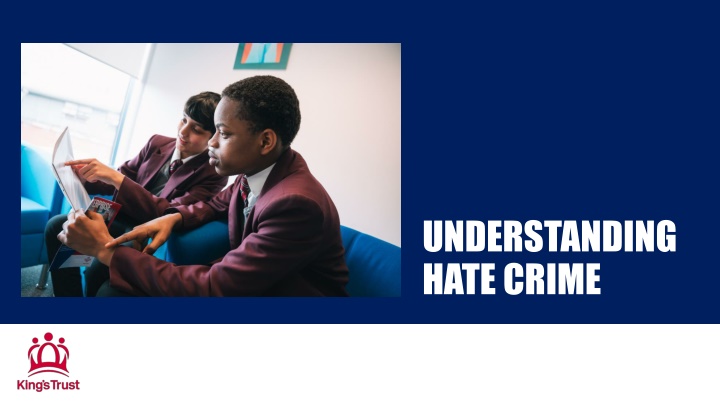
Hate Crimes: Types, Impact, Reporting, and Education
Explore the definition of hate crimes, the different forms they can take, their impact, the importance of reporting them, and why hate crime education is crucial. Understand the characteristics and victims of hate crimes, and learn about the perpetrators and various forms in which hate crimes manifest.
Download Presentation

Please find below an Image/Link to download the presentation.
The content on the website is provided AS IS for your information and personal use only. It may not be sold, licensed, or shared on other websites without obtaining consent from the author. If you encounter any issues during the download, it is possible that the publisher has removed the file from their server.
You are allowed to download the files provided on this website for personal or commercial use, subject to the condition that they are used lawfully. All files are the property of their respective owners.
The content on the website is provided AS IS for your information and personal use only. It may not be sold, licensed, or shared on other websites without obtaining consent from the author.
E N D
Presentation Transcript
UNDERSTANDING HATE CRIME
WHAT ARE WE COVERING? What is a hate crime Types of hate crimes Different forms that Hate crime can take place What impact can it have Why is it important to report hate crimes Why is hate crime education so important Understanding hate crime
WHAT DO YOU KNOW ABOUT HATE CRIME? Write on your post-it s what you already know about hate crime. Understanding hate crime
WHAT WOULD YOU LIKE TO KNOW MORE ABOUT? What else would like to know about hate crime? Write it down on the post-it notes, and we will revisit this at the end of the session. Understanding hate crime
WHAT IS A HATE CRIME? A hate crime is any criminal offence which is perceived by the victim, or anybody else, to be motivated by hostility or prejudice towards identity (Characteristics) The Crown Prosecution Service. A hate crime can include verbal abuse, intimidation, threats, harassment, assault and damage to property. Understanding hate crime
What do you think are parts of someone's identity that someone could dislike?
THE FIVE CHARACTERISTICS These five protected characteristics outline what a hate crime can be towards. Someone's; 1. Race - Nationality, ethnicity, skin colour, heritage 2. Faith Religion, and belief 3. Sexual orientation people who identify as gay, lesbian, bi or straight 4. Disability Physical, hearing, sight, mental health and learning disabilities 5. Transgender Identity People who identify as trans (transgender or transsexual) Understanding hate crime
WHO CAN BE A VICTIM OF A HATE CRIME? Understanding hate crime
WHO CAN BE A PERPETRATOR OF A HATE CRIME? Understanding hate crime
WHAT ARE THE DIFFERENT FORMS IN WHICH HATE CRIMES TAKE PLACE? A hate crime can take place in different forms but the one thing that is common amongst all hate crimes is that the victim has been targeted because another person does not like who they are because of their: race religion sexual orientation gender/transgender identity disability Understanding hate crime
WHAT ARE THE DIFFERENT FORMS IN WHICH HATE CRIMES TAKE PLACE? One example of a form of hate crime is violence or physical assault. What other forms of hate crimes can you think out? Understanding hate crime
VIDEO ACTIVITY4: Watch the following video and think about these questions: How did this video make you feel? How do you think the people in the video felt? Hate Crime - Nationwide Campaign - YouTube Understanding hate crime
REAL LIFE SCENARIO STEPHEN LAWRENCE Who is Stephen? Stephen Lawrence was a black teenager who lived in Eltham in South London. He was studying for his A-levels and wanted to be an architect when he was older. He lived with his mum, dad, brother and sister. Understanding hate crime
REAL LIFE SCENARIO STEPHEN LAWRENCE What happened? Stephen aged 18 at the time was killed by a gang of white men in a racist attack. He had been waiting for a bus with a friend, when the gang attacked them. Stephen's friend escaped unhurt, but Stephen died from his injuries. Understanding hate crime
REAL LIFE SCENARIO STEPHEN LAWRENCE What happened next? The 4 men were put on trial in court regarding Stephen's murder but were let go due to lack of evidence. In the months and years that followed Stephen's murder, Stephen's mum and dad kept fighting for justice for their son. Many people believed the police treated Stephen's case differently because he was black - and that some officers acted in a racist way In 2012, two of the original suspects in Stephen's killing, were found guilty of his murder and sent to prison, after new evidence was found. Stephens Murder was a confirmed as a hate crime due to his Race Understanding hate crime
BARRIERS TO REPORTING A HATE CRIME Despite more and more reports being made about hate crimes on a yearly basis since 2012, it is still widely accepted that a lot of victims of hate crime don t report them. What do you think are some barriers to reporting hate crimes? Understanding hate crime
WHY MIGHT HATE CRIMES NOT BE REPORTED? 10% of lesbians and gay men claimed that the fear of being outed was a barrier to reporting. (Stonewall, 2013) One of the key reasons why a disabled person would not report a disability hate crime to the police was because they felt they would not be treated with respect. Experiencing hate crime, many victims don t recognise what hate crime is and their right to report it. Swadling et al. (2015) 25% of victims didn t feel their complaint would be taken seriously 41% of victims felt that the offence was note serious enough to report Disability Rights UK (2004) (Stonewall, 2013) (Stonewall, 2013) Understanding hate crime
IMPORTANCE OF REPORTING HATE CRIMES Discuss why it is important to report hate crimes Understanding hate crime
WHAT HAPPENS TO SOMEONE IF THEY COMMIT A HATE CRIME? Depending on the offense, the below will be a process someone goes through when committing a hate crime. Arrested and questioned by the Police. Either released so that the police can get more information or charged Appear in court Could face a maximum of 7 years in prison, pay a fine, or both Understanding hate crime
WHAT YOU CAN DO TO HELP SOMEONE WHO HAS WITNESSED OR EXPERIENCED A HATE CRIME By reporting, you can help stop the person who committed the hate crime from doing this again. You can report this to a teacher, the police or an adult over 18 who can support you If you have witnessed a hate crime, it can be helpful to a victim to speak to them in a friendly manner and reassure them, if it is safe for you to do so Witnessing a hate crime can be distressing and it may be helpful for you to speak about what you have come across and talk through your feelings. This can be with someone you trust such as a family member, friend, teacher, neighbour or doctor. Understanding hate crime
WHAT ORGANISATIONS CAN HELP? Understanding hate crime

![Prevention and Combating of Hate Crimes and Hate Speech Bill [B.9B.2018]](/thumb/60513/prevention-and-combating-of-hate-crimes-and-hate-speech-bill-b-9b-2018.jpg)

